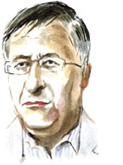

There have always been people for whom the ego is a prison. Nearly all of them – those who have written on the subject, at any rate – have wanted to escape from being human into something that lies outside the natural world. Throughout history the perception that there is something defective and claustrophobic in human personality has been recognized and accepted. Disgust with humanity is among the most ancient human traditions. It is only now, when the ego is commonly so enfeebled that it can scarcely subsist without a constant diet of abject admiration, that revulsion against humanity is condemned as misanthropy.
Pascal's dictum "The ego is hateful" may have been starkly expressed, but the sentiment was in no way unfamiliar or aberrant. Pascal identified the ego with appetite, or desire; "le moi" signified his animal self. Like other monotheists he cherished the notion that personality is the supreme value: a divine person created the world, and humans alone among animals partake of that personality. Escaping the ego meant suppressing the instincts humans share with other animals and submitting to an all-powerful ego whose essence is spiritual. In this type of monotheism there is no radical negation of selfhood, and not all who have looked to escape confinement in the ego have sought freedom in submission to a transcendent ego.
There have long been alternative traditions that envision a more complete emancipation. According to the Gnostics the visible world was the work of a malign demiurge, a false god that had usurped the place of the true divinity. For these heresiarchs transcending the ego meant exiting the created world and ceasing to be an individual. Again, there are Manichean texts that speak of "the luminous self", a metaphysical ego shut up in the human body, whose destiny it is to reunite with the heavenly consciousness from which it has been separated. Plato had a similarly mystical view: human selfhood is like individuality of all kinds in being deceptive; once the veil of maya is torn away the ego, which never truly existed, will vanish, and only spiritual reality will remain. This Platonistic view runs in parallel with the Vedanta and Buddhism, for which the ego is an illusion that will disappear – whether into a universal self,
or into nothing at all – with the attainment of enlightenment.
All these mystical philosophies look for an exit from the ego in a realm outside the natural world. But there is a yet older tradition that looks elsewhere for release from the ego. Animism, the primordial religion, has always contained shamanistic practices in which the human ego is expelled, or temporarily destroyed, in order to leave room for experience of another kind. The shaman may roam in other realms, but the result is a new perception of the quotidian world. Shifting one's shape to become an animal or bird allows that world to be seen from another perspective, which is no longer only human.
The literature of shape-shifting is more extensive than one might think. Amongst twentieth-century English-speaking poets Robinson Jeffers, D.H. Lawrence, Edward Thomas and Ted Hughes tried in different ways to find a language that could express a non-human view of things. It is an enterprise whose paradoxical character these poets recognized. Thomas wrote of "a pure thrush word" that pointed to a world human speech could not reach. Much of his poetry was an attempt to find that word. Yet Thomas's verse is notable chiefly for the passion with which it articulates a human mood of self-conscious melancholy; there is no escape from ego, only a recurrent lament that such escape is impossible.
In each of these poets the inhuman world is mostly an all-too-human projection, a site for displaced personal emotion. A more sustained attempt to enter a nonhuman view of things is J.A. Baker's little-known prose masterpiece The Peregrine. Recently reissued by New York Review Books, it was first published in 1967 and acclaimed as an outstanding piece of nature writing. It is in fact something more extraordinary. A record of Baker's pursuit of two pairs of peregrines, which had arrived to hunt in the area of East Anglia where Baker lived, the book slowly reveals itself as the record of a modern experiment in shamanism. Following the movements of the birds with single-minded intensity, alone and over a period of ten years, he writes of the shift in which the human observer finally seemed to become the inhuman hawk.
"Wherever he goes this winter," Baker begins, "I will follow him. I will share the fear, and the exaltation, and the boredom, of the hunting life." As his pursuit continued, year after year, he shed the shape of the human observer: "In a lair of shadow the peregrine was crouching, watching me, gripping the neck of a dead branch. We live, in these days in the open, the same ecstatic fearful life. We shun men. We hate their suddenly uplifted arms, the insanity of their flailing gestures, their erratic scissoring gait, their aimless stumbling ways, the tombstone whiteness of their faces." The shift from human to hawk allowed Baker a sensation of freedom not given to the species to which he belongs: "Watching the falcon receding up into the silence of the sky, I shared the exaltation and serenity of her slow ascension. As she dwindled higher, her circles were widened and stretched out by the wind, till she was only a sharp speck cutting across white cloud, a faint blur on blue sky."
Continues in the print edition. Order now.